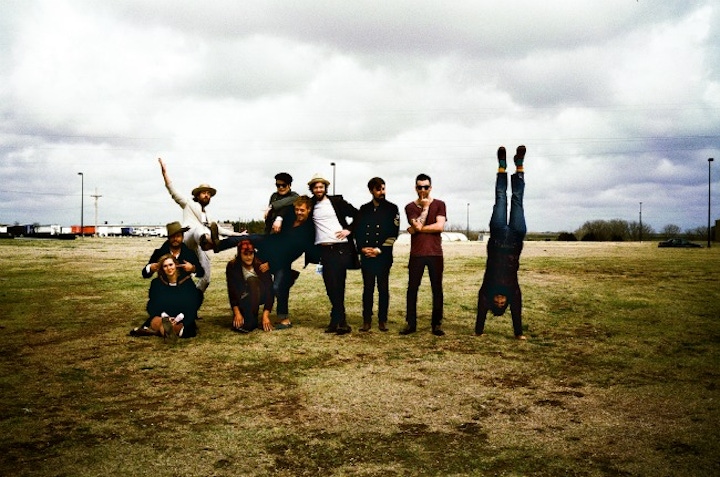
Discarding the Rock Star Posture : Best Fit meets Edward Sharpe and the Magnetic Zeros
“We had to have a lot of faith,” states Alex Ebert, the lead singer of the American folk band Edward Sharpe and the Magnetic Zeros of the experience of making the band’s second album Here, out now via Rough Trade. “We went through a lot of shit as a band over the last four years, and we toured a lot, and we were really tired by the time we decided to go make this album. It wasn’t easy for some people to decide to jump back into it.
The story of Edward Sharpe began five years ago, when the group recorded the song “Home” and spent the next year and a half recording the music which eventually became their debut album Up From Below. Fast forward three years and they’ve become a fixture at music festivals like Bonnaroo and Coachella and travelled across America by train with Mumford and Sons. For Ebert, the experience of playing with the band has been as much about healing himself as it has been about making music: “It was part of my searching for myself again, and searching for the meaning of music and life. Having become somewhat of a robot, I had to think back to when I had a heart.”
Edward Sharpe and the Magnetic Zeros are as much loved for their live performances as they are for their recorded music, and I ask Ebert whether or not the band purposefully tries to offer their audiences a certain experience – or if the experience just happens. “The main objective,” he answers, “is to go up there and be free, and be loose and just be. When discarding the rock star posture and digging into the spirit of music, and getting to that ecstatic state – uplifting things just tend to happen.” As for whether this is intentional or not? “I do think it is an intention to drive ourselves into this free state. That’s the goal of music in a lot of ways.”
Throughout our chat Ebert makes frequent references to this idea of “rock star posture,” locating it in the context of two selves: one self is a snarling rock star figure that he frequently fights against, the other is the person and musician he’s become since forming Edward Sharpe and the Magnetic Zeros. He recounts a story about when the band played Coachella in 2010 that makes this distinction especially apparent. “I’m feeling pretty nervous in some ways,” Ebert begins. “In order to free myself up and prove to myself that I don’t care and I’m free, I take the microphone stand and just chuck it off stage. And it bounces off the grass and right onto someone’s forehead. And he’s bleeding. And this is before we’ve even played a note. And the cameras have this bleeding kid on the jumbotron and I realize I’m blowing it.”
“So I go down to the kid, I take off my shirt, and I wrap his head with my shirt and I apologize. And for the rest of the show I drop all of the hang-ups and the snarling bullshit and posture that I was falling back on. It was an amazing lesson for me.”
Much of the ethos of Edward Sharpe as it’s reflected in their songs seems to be focused on a psychedelic happiness, so I ask Ebert whether there’s a place for pain in the band’s music. “Definitely,” he says. “I consider a lot of the music to be quite heavy and dark in a way. I think the difference for me is that it’s always very defiant. The transcendence of that pain lies in a defiant sort of faith in ourselves. A song like “Man on Fire” [the lead single from Here] is about exactly that – dancing over the murder and the pain, the heartache, the shame and the range.” Ebert again makes the distinction between his old rock star personality and his new self – “The difference is I used to dive into that dark side and stay there. Now I dive in there to prove the strength of love. Not to self-destruct but to prove the strength of faith.”
In many ways, Here is a much softer and more subtle album than Up From Below. If Up From Below is the album you listen to at the beginning of a road trip, Here is the album you listen to when you’re halfway through. I ask Ebert if he has a favourite track on the album, and he replies “I Don’t Wanna Pray”. “It’s one of the more challenging songs we’ve put out as a band because it’s using the word God and that’s a leap in some ways. It’s more of a song based on a hunch and a feeling and using a language that’s very provocative for everyone.”
As the conversation draws to a close, I remark that the last few years have been busy for Edward Sharpe with the band touring relentlessly around the world, so I’m curious to know if there’s anywhere Ebert would like to travel that he hasn’t gone yet. “I want to go all over the place. Anywhere we haven’t been.” He pauses, and repeats: “Anywhere. I’m down to go anywhere.”
Here is available now through Rough Trade Records.
Get the Best Fit take on the week in music direct to your inbox every Friday

Tunde Adebimpe
Thee Black Boltz

Julien Baker & TORRES
Send A Prayer My Way

Bon Iver
SABLE, fABLE





